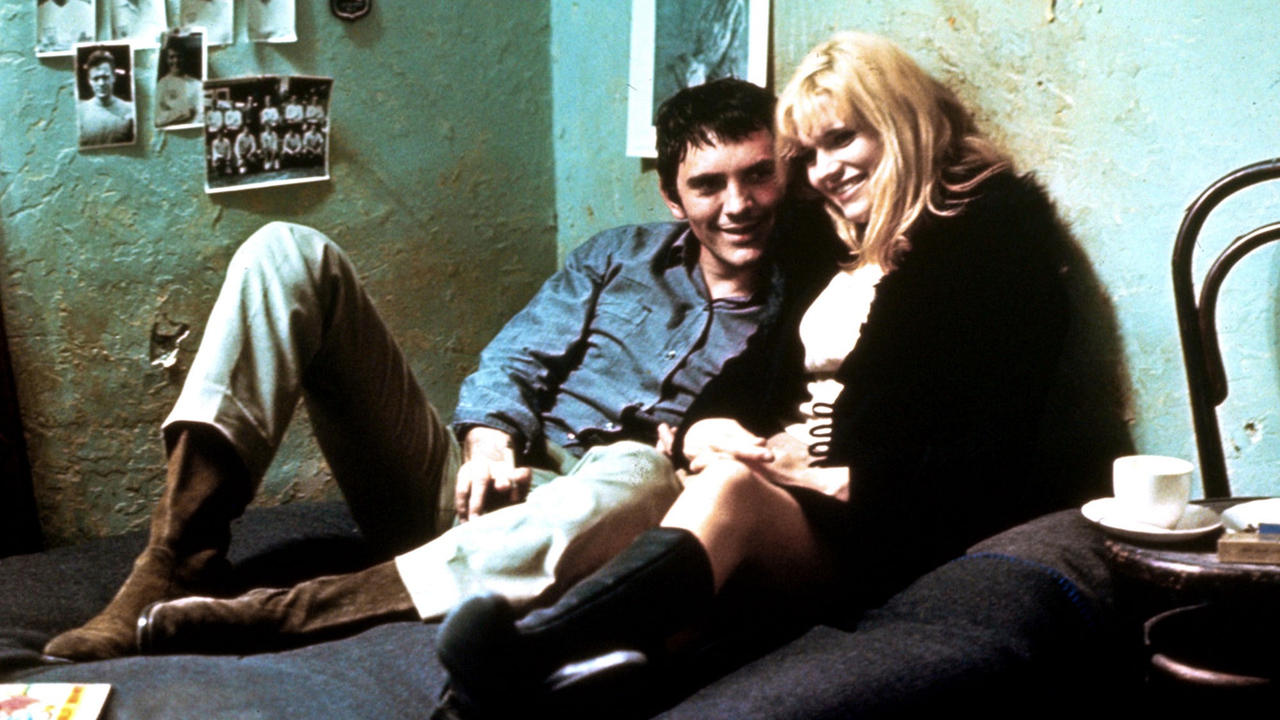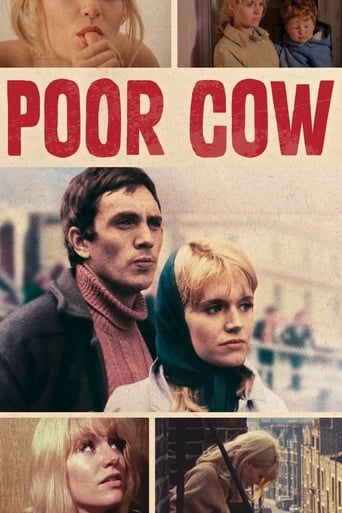

You know what to expect when the first scene in Ken Loach's "Poor Cow" is a graphic image of Carol White's character giving birth to her son, although for my taste this was taking documentary realism to extremes. For the remainder of the film we follow White's progress, if that's the right word, for the next few years as she lives a mostly tawdry life on the edge of both poverty and legality, interacting with a mostly dubious set of individuals in not-so-swinging London in the mid-60's.The narrative is somewhat awkwardly interspersed with chapter plates, presumably written by White, although these don't actually aid the structure of the piece as the film progresses pretty much on a tangential basis although as an insight into her character's naive optimism and childlike simplicity, they may serve some purpose. Loach's soon to be trademark fly-on-the-wall camera-work is never still, long-shots, extreme close-ups, walking shots, tracking shots all to convince us like his acclaimed TV documentary "Cathy Come Home", of the previous year (with the same actress in the lead) of the veracity of his subject, stripping away all cinematic artifice. In this he succeeds, inviting no pity for her, only portraying her making do and working with what she has, with little prospect of escape.Of course this unremittingly bleak outlook can be overbearing and cold and there are many scenes where he could and should have called "Cut!" earlier, but as an insight into the working class of supposedly affluent Britain, it's important to hold up a mirror to society as he does here.In the final scenes, when White is reunited with her temporarily lost child, we are brought full-circle to that shocking opening scene as he reminds us that family love is perhaps the only true love. Whether it will be enough of a basis for White to break out and make a life for herself and her son is debatable so that some sort of a sequel might have been interesting to consider.The cast is an interesting with one with Terence Stamp demonstrating his range as the crook who White falls for and who shows her a kind of loving, even as the film makes clear in the only stagy scene in the film, his courtroom trial, that there are no victimless crimes. As in "Cathy Come Home", White holds the viewer's attention with her disarming honesty, vulnerability and spirit. Interesting to see the notorious John Pindin in a prominent role too.You don't watch a Loach film for comfortable viewing but as an agent-provocateur, turning over stones most would step over, he's an important director in British cinema.
... View MoreThis film can only be appreciated by someone who lives or has lived in London, especially in the late 60s. The important thing about Poor Cow is not so much as what's happening close up on screen involving fairly inane characters, but what's happening behind them. The film is a rich slice of what life was really like for people who knew little of or could afford less of the so called swinging sixties. I dont think Ken Loach wanted people to identify or feel sympathy for the main character; The woman is basically good hearted but this nice trait is soon destroyed by her lies (to Dave in Prison concerning other men) and by her stout working class expose "All you really need is a man, a kid and a couple of rooms"Dont forget, this film will mean nothing to anyone who dosen't actually remember how bad some parts of London actually were in the 60s and dont blame our poor cow for her blinkered closed outlook. This film was well before the days of career women. A career woman of the 60s would likely have been regarded a closet lesbian and little else. The film was made well before the days of women's emancipation and I think most modern day audiences will miss that. You cant appreciate this film until you actually THINK POOR SIXTIES..... when the internet would have been used for fishing. Watch it again....I swear you can smell rotting vegetation all the way through it.....or was that my Cats.
... View MoreRecently released on British DVD, this is a good movie (as long as you have an attention span and IQ of more than a fruit fly). Not as depressing as it could have been, this is kitchen-sink at its most dirty. Terrance Stamp is great in it, the music is sweet, Carol White is very believeable as the single mum tart who can't stop loving criminals.My favourite scene is where Carol and her friend who works in the pub with her (the one with the enormous beehive hairdo which comes down over one eye) sit outisde and gossip about all the men who walk past.The only thing that marred this was the shakey acting of Carol's first husband, but if you can get past that, you're OK. And Donovan provides some of the most languid, mellow, bittersweet lyrics to come out of the 60s.
... View MoreBack in the 60's, this grim study of Joy, a young proletarian wife, was the introduction to the career of Ken Loach, who became one of the most distinguished and respected British filmmakers of all time. By then I knew very little about Brecht, politics or the reality of the under-privileged, and I was quite impressed by the aesthetics of the film, its free style, its austere color cinematography, and Joy's monologues in front of the camera. I was also much surprised to find that Terence Stamp (who had become a celebrity, thanks to "Billy Budd", "The Collector" and "Modesty Blaise") had so little screen time. Although 20th Century Fox distributed "Poor Cow" in Panama, Loach did not join mainstream cinema (which this film hardly is) and I lost contact with his films. I just heard of his successes, "Kes", "Family Life", "Black Jack". until I caught up in the 80's. The beautiful title song by Donovan, by the way, is available in his anthology "Troubadour".
... View More